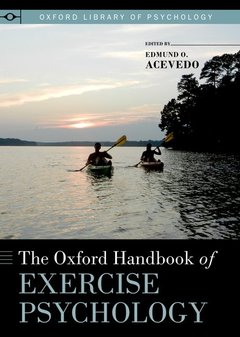Description
The Oxford Handbook of Exercise Psychology
Oxford Library of Psychology Series
Coordinator: Acevedo Edmund O.
Language: English
Subjects for The Oxford Handbook of Exercise Psychology:
Publication date: 06-2012
552 p. · 25.4x18.3 cm · Hardback
552 p. · 25.4x18.3 cm · Hardback
Description
/li>Contents
/li>Biography
/li>
Awareness of the importance of exercise and physical activity to optimal physical and mental health has never been greater. It is widely acknowledged that physical inactivity is a leading cause of death, yet statistics show less than 50% of Americans participate in regular physical activity. This information highlights the public health challenge of increasing participation in physical activity to enhance physical health and to buoy the psychological benefits associated with physical activity. The Oxford Handbook of Exercise and Psychology is an authoritative and comprehensive presentation of the breadth and depth of empirical contributions utilizing state-of-the-science theories and approaches in exercise psychology. Chapters are authored by leading investigators across the globe who have made significant scientific contributions addressing the behavioral aspects of physical activity. Sections of the book address the effects of physical activity on mental health; knowledge gathered utilizing psychobiological perspectives; behavioral factors that impact exercise motivation; scientific contributions addressing the physical activity benefits with special populations, including individuals with physical disabilities, older adults and cancer patients; and promising areas for additional investigation. Each chapter presents a summary of scientific advancements in the topic area as a foundation for future investigation. Fueled by a broad range of disciplines and interdisciplinary approaches, the field of exercise psychology is growing, and this comprehensive handbook will be the perfect resource for students, researchers, and physicians interested in exercise motivation and the mental health benefits of physical activity.
Contents. I. Context, Issues, and Perspectives in Exercise Psychology. 1. Exercise Psychology: Understanding the Mental Health Benefits of Physical Activity and the Public Health Challenges of Inactivity. Edmund O. Acevedo. 2. Physical Activity Epidemiology. Ian Janssen. II. Exercise Psychology and Mental Health. 3. The Ultimate Tranquilizer? Exercise and Its Influence on Anxiety. Steven J. Petruzzello. 4. Body Image and Exercise. Kathleen A. Martin Ginis, Rebecca L. Bassett, and Catherine Conlin. 5. Physical Activity and Cognitive Function: Theoretical Bases, Mechanisms, and Moderators. Jennifer L. Etnier and Jeffrey D. Labban. 6. Exercise and Health-Related Quality of Life. Brian C. Focht. 7. Physical Activity as a 'stellar' positive psychology intervention. Kate Hefferon and Nanette Mutrie. III. Exercise Psychology and Psychobiological Perspectives. 8. Psychoneuroendocrinology and Physical Activity. Mark Hamer. 9. Muscle Pain During and Following Exercise. Christopher D. Black. 10. Cardiovascular Health Implications of Combined Mental and Physical Challenge. Edmund O. Acevedo, Heather E. Webb, aamp, Chun-Jung Huang. IV. Psychology of Exercise Motivation. 11. Personality and Physical Activity. Ryan E. Rhodes and Leila A. Pfaeffli. 12. Psychosocial Influence. Martin S. Hagger. 13. Theoretical Approaches to Exercise Promotion. David M. Williams aamp, Bess H. Marcus. 14. Theoretical Approaches to Physical Activity Intervention. Claudio R. Nigg and Karly S. Geller. 15. Social Cognitive Models. Ryan E. Rhodes and Rachel Mark. 16. Exercise is a many-splendored thing but for some it does not feel so splendid: Staging a resurgence of hedonistic ideas in the quest to understand exercise behavior. Panteleimon Ekkekakis and Manolis Dafermos. V. Exercise Psychology in Special Populations. 17. Exercise Psychology and Physical Disability. Jeffrey J. Martin. 18. Physical Activity and Exercise in Older Adults. Louis Bherer. 19. Children's Motivation for Involvement in Physical Activity. Robert J. Brustad. 20. Exercise Psychology and Children's Intelligence. Phillip D. Tomporowski, Jack A. Naglieri, and Kate Lambourne. 21. Cancer Patients. Amy E. Speed-Andrews and Kerry S. Courneya. VI. Exercise Psychology: On the Horizon and into the Future. 22. Psychology of Resistance Exercise. Daniel B. Hollander and Robert R. Kraemer. 23. Tai Chi as an Alternative Mode of Exercise Activity for Older Adults. Fuzhong Li.
Edmund O. Acevedo, Ph.D., is Professor and Chair, Department of Health and Human Performance, Virginia Commonwealth University.
© 2024 LAVOISIER S.A.S.




